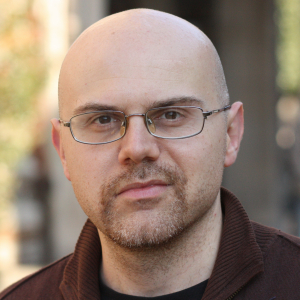A philosopher by training, Francesco Di Iorio welcomes the historical approach to understanding ideas that he has encountered as a 2012-13 fellow of the HOPE Center. For the past several years Francesco has been studying Friedrich Hayek’s epistemology, and at the Center he has seen the value of biography and archives in enriching his understanding of his subject.
And just as much, he welcomes the role that discussion plays in the life of the Center. Indeed, it is the high value placed on discussion that perhaps most distinguishes the intellectual life at the Center from the intellectual life he experienced in Italy and France, where he did his undergraduate and graduate work, respectively.
As visitors to and fellows of the Center know, in the Friday lunches and workshops, an author will present a paper to an audience of a dozen or so people. Most of the time is given to the audience to comment on the paper and ask the author questions. “Most members of the audience are historians, and it is through their interactions with the author that I’ve been really able to see how a historical approach can shed light on a person’s ideas.”
Francesco has been working on Hayek’s epistemology since he was an undergraduate student at Libera Università Internazionale degli Studi Sociali, in Rome, where he studied under Dario Antiseri, who introduced Francesco to the works of Karl Popper and Hayek. He did his PhD work at two universities in Paris, the EHESS and the Centre de Recherche en Épistémologie Appliquée of École Polytechnique. His thesis, which he completed in 2012 and wrote under the direction of Jean Petitot, was titled “Cognitive Autonomy and Methodological Individualism : Reflections on Hayek’s Epistemology of Action.”
In his present work Francesco is trying to clarify just what methodological individualism means. To do that, he is comparing Hayek’s works with those of others, such as Hans-Georg Gadamer, Raymond Boudon, and Maurice Merleau-Ponty. Francesco says that methodological individualism is usually misunderstood. It is not, as many people think, a reductionist theory of the social world; in fact, according to Francesco, methodological individualism and reductionism are different things and have nothing to do with each other. Likewise, many people think that methodological individualism is based on a utilitarian theory of rationality. Francesco is trying to show instead that methodological individualism embraces a wide conception of rationality, one that cannot be reduced to a utilitarian concept.
As a young Hayek scholar, it is only natural that Francesco found his way to the Center, whose director, Bruce Caldwell, is the editor of Hayek’s Collected Works and the author of an important intellectual biography of Hayek. Before arriving at the Center, Francesco had met Bruce three times, once in Paris and twice in New York. Francesco says that having Bruce around to talk with and bounce ideas off of has helped his work tremendously.
Reflecting on his PhD work, Francesco says it is ironic that he worked on Hayek at the École Polytechnique. Hayek once famously criticized the École Polytechnique for being the home of the French social engineers. “So there I found myself, defending Hayek’s ideas to my classmates and professors at the same school.”
--Paul Dudenhefer
